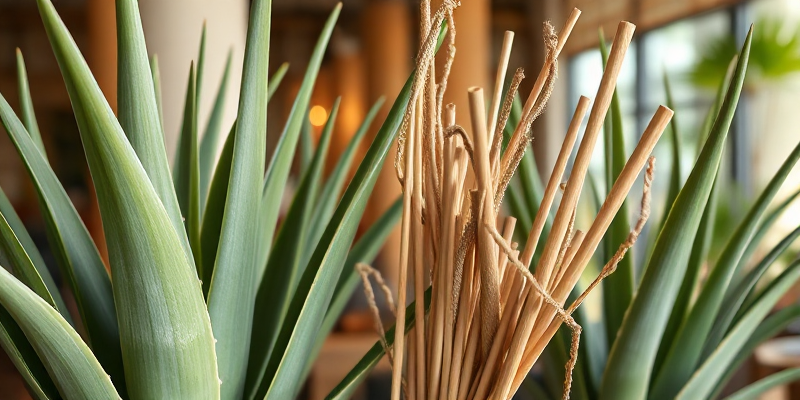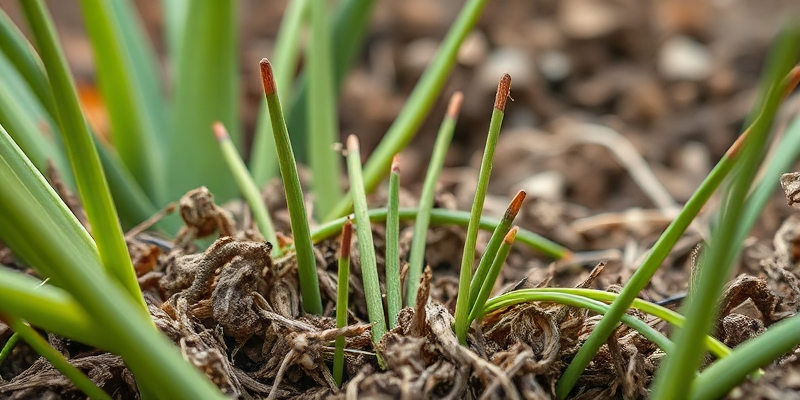ماحولیاتی شعور کے کاروبار کے ل Ag ایگاو اسٹرا: پائیدار & حسب ضرورت

تعارف: پلاسٹک پر پابندی اور اگوا اسٹرا کا عروج

اس کی تصویر: یہ آپ کے ریستوراں ، ہوٹل ، یا کیفے میں جمعہ کی رات مصروف ہے۔ میزیں بھری ہوئی ہیں ، احکامات بہہ رہے ہیں ، اور آپ کے سرورز مشروبات فراہم کررہے ہیں… بالکل کیا؟ وہ پلاسٹک کے تنکے جو کبھی ہر جگہ عام تھے اب دنیا بھر میں 60 سے زیادہ ممالک اور سیکڑوں شہروں میں غیر قانونی ہو رہے ہیں۔ آپ کے پینے کے بھوسے کا انتخاب ایک چھوٹی سی تفصیل کی طرح لگتا ہے ، لیکن یہ آپ کے برانڈ کی ماحولیاتی وابستگی کو کس طرح محسوس کرتا ہے اس میں یہ ایک واضح عنصر بنتا جارہا ہے۔
Enter agave straws – the eco-friendly alternative made from the fibrous byproducts of tequila production. These aren’t just any sustainable straws; they’re rapidly becoming the go-to solution for businesses serious about sustainability without compromising on quality or customer experience.
The plastic straw problem is more significant than many realize. According to recent estimates, over 500 million plastic straws are used daily in the United States alone—enough to circle the Earth 2.5 times. Each of these straws can take up to 200 years to decompose, leaving a legacy of environmental damage long after the brief minutes they’re actually used.
Discover a better alternative with agave straws for your busines جو صرف ماحول دوست لائنوں کی کم از کم نیلیوں کو پورا نہیں کرتا ہے بلکہ استحکام ، تخصیص کے اختیارات ، اور ریگولیٹری تعمیل میں توقعات سے تجاوز کرتا ہے۔ متناسب کاغذی متبادلات کے برعکس جو جلدی سے یا پی ایل اے "کمپوسٹ ایبل" اختیارات کو ختم کرتے ہیں جن کے لئے صنعتی سہولیات کو توڑنے کے لئے درکار ہوتا ہے ، ایگاو اسٹرا ایک عملی حل پیش کرتے ہیں جو حقیقی دنیا کے بسین کی ترتیبات میں کام کرتا ہے۔
فارورڈ سوچ رکھنے والے کاروباروں کے ل Ag ایگاو اسٹرا کو خاص طور پر پرکشش بنا دیتا ہے جو ان کی اصل کہانی ہے۔ وہ شراب کی پیداوار کے بعد اگوا پودوں سے ریشوں کے فضلہ کا استعمال کرتے ہوئے تیار کیے گئے ہیں ، جس سے سرکلر معیشت کی مصنوعات تیار کی گئی ہے جو زرعی فضلہ کو دوبارہ تیار کرتی ہے۔ یہ پائیدار لائف سائیکل میکسیکو کے دھوپ سے بھرا ہوا کھیتوں میں شروع ہوتا ہے اور آپ کے صارفین کے مشروبات میں اختتام پذیر ہوتا ہے۔
اگوا اسٹرا پر سوئچ صرف پلاسٹک پر پابندی یا جرمانے سے بچنے کے بارے میں نہیں ہے (حالانکہ یہ یقینی طور پر اہم ہے)۔ یہ پائیداری کی تحریک میں سب سے آگے آپ کے بسوں کو پوزیشن میں لانے ، ماحولیاتی قیادت کا مظاہرہ کرنے ، اور حقیقی ماحول دوست دوستانہ طریقوں کے لئے صارفین کی بڑھتی ہوئی طلب کو پورا کرنے کے بارے میں ہے۔
ریگولیٹری تعمیل: ایف ڈی اے & Agave تنکے کے لئے LFGB سرٹیفیکیشن

جب کھانے اور مشروبات کے ساتھ براہ راست رابطے میں آنے والے مواد کو سورسنگ کرنا ، ریگولیٹری تعمیل اختیاری نہیں ہے - یہ ضروری ہے۔ بہت سارے کاروباروں نے یہ سبق صرف "ماحول دوست" متبادلات میں سرمایہ کاری کرنے کے بعد مشکل طریقے سے سیکھا ہے تاکہ وہ حفاظتی معیارات پر پورا نہیں اترتے ہیں۔
Agave straws from NatureBioEco come with critical certifications that protect both your busines and your customers. FDA certification ensures that these straws meet the rigorous safety standards required by the Food and Drug Administration (rel=”nofollow”) for food-contact materials. Similarly, LFGB certification (the German Food, Articles of Daily Use, and Feed Code) provides additional assurance that these products meet European safety standards, which are often even more stringent than their American counterparts.
Why does this matter for your busines? According to a 2023 industry survey, 73% of food service businesses reported concerns about liability issues related to non-certified sustainable alternatives. This concern is well-founded—businesses can face fines of up to $10,000 per violation for using non-compliant food contact materials, not to mention the reputational damage from potential safety incidents.
Consider the case of a national coffee chain that had to recall millions of “eco-friendly” straws in 2022 due to lack of proper food-safety certification. The financial impact exceeded $1.2 million, but the damage to their sustainability credentials was immeasurable.
Learn more about regulatory compliance for sustainable straws to ensure your busines stays ahead of changing regulations. With proper certification, you gain:
- Legal protection against regulatory violations
- Enhanced customer trust through demonstrable safety compliance
- Simplified procurement processes, especially for multi-national operations
- Future-proofing against increasingly stringent environmental regulations
When evaluating agave straws or any eco-friendly alternative, always request documentation of these certifications. NatureBioEco provides complete transparency with all regulatory paperwork readily available for your procurement team’s review.
کس طرح اگوا اسٹرا کا موازنہ دوسرے ماحولیاتی متبادل سے ہوتا ہے

In the increasingly crowded market of sustainable straws, making the right choice requires understanding the unique advantages and limitations of each option. Let’s compare agave straws with other popular alternatives:
| خصوصیت | اگوا اسٹرا | کاغذ کے تنکے | PLA “Compostable” Straws | گنے کے تنکے | Metal/Glas Reusable |
|---|---|---|---|---|---|
| ——— | ————- | ————- | ———————— | ——————— | ———————- |
| پائیداری | 3+ hours in liquid | 15-45 minutes | 1-2 hours | 2-3 گھنٹے | غیر معینہ |
| سڑن | Home compostable in 90 days | 30-60 دن | Requires industrial facility | 90-180 دن | N/A (must be recycled) |
| ذائقہ کا اثر | غیر جانبدار | Often affects taste | Slight plastic feel | غیر جانبدار | Metallic/temperature conducting |
| حسب ضرورت | High (color, size, branding) | محدود | اعتدال پسند | اعتدال پسند | Limited and expensive |
| فی یونٹ لاگت | $0.03-0.06 | $0.01-0.04 | $0.04-0.07 | $0.03-0.06 | $0.50-3.00 |
| Maintenance | کوئی نہیں | کوئی نہیں | کوئی نہیں | کوئی نہیں | Washing/sanitizing required |
A revealing statistic: A 2023 consumer satisfaction study found that 78% of customers reported dissatisfaction with paper straws dissolving in their drinks, compared to only 7% reporting any issues with agave straws after 60 minutes of use. This dramatic difference in performance directly impacts customer experience and satisfaction.
Discover why sugar cane straws are another excellent eco-friendly option with similar benefits to agave. While both are excellent choices, agave straws often have a slight edge in durability for cold drinks, while sugar cane performs exceptionally well with hot beverages.
جو چیز اگیو اسٹرا کو خاص طور پر پرکشش بناتی ہے وہ ہے عملی بسینوں کے ان کے توازن کو حقیقی ماحولیاتی اسناد کے ساتھ فوائد حاصل کرتے ہیں۔ کاغذی تنکے کے برعکس جو جلدی سے سوگ یا پی ایل اے کے تنکے بن جاتے ہیں جن کے لئے مخصوص صنعتی کمپوسٹنگ سہولیات کی ضرورت ہوتی ہے (جس میں بہت سی میونسپلٹیوں کی کمی ہوتی ہے) ، ایگاو اسٹراز صارف کا تجربہ روایتی پلاسٹک کی طرح ہی فراہم کرتے ہیں جبکہ واقعی گھر میں کمپوسٹ ایبل ہوتے ہیں۔
دوبارہ قابل استعمال بمقابلہ ڈسپوز ایبل مباحثے پر بھی غور کیا جاتا ہے۔ جبکہ دوبارہ استعمال کے قابل تنکے کی کچھ بسین ماڈلز میں اپنی جگہ ہے، وہ زیادہ تر فوڈ سروس کی کارروائیوں کے ل log لاجسٹک چیلنجز پیش کرتے ہیں ، جن میں دھونے کے اخراجات ، چوری/LOS کے مسائل ، اور زیادہ ابتدائی سرمایہ کاری شامل ہیں۔ ایگاو اسٹرا ایک نمایاں طور پر کم ماحولیاتی نقش کے ساتھ ڈسپوزایبل کی سہولت پیش کرتے ہیں۔
ایگاو اسٹرا میں تبدیل ہونے کے ٹاپ بسین فوائد
ماحولیاتی تحفظات سے بالاتر ، ایگاو اسٹراز کنکریٹ بسین فوائد فراہم کرتے ہیں جو آپ کی نچلی لائن اور صارفین کے اطمینان کو براہ راست متاثر کرتے ہیں۔
### بڑھا ہوا برانڈ امیج اور کسٹمر کی وفاداری
آج کے صارفین پائیداری کی اسناد کی بنیاد پر تیزی سے خریداری کے فیصلے کر رہے ہیں۔ 2023 میں نیلسن کے ایک مطالعے سے انکشاف ہوا ہے کہ 73 ٪ عالمی صارفین ماحولیاتی اثرات کو کم کرنے کے لئے اپنی کھپت کی عادات کو تبدیل کرنے پر راضی ہیں ، 46 فیصد نے بتایا کہ وہ ماحولیاتی استحکام کے لئے وابستہ کمپنیوں کی مصنوعات کے لئے زیادہ ادائیگی کریں گے۔
مارکیٹنگ کے مواد اور پوائنٹ آف سروس میں آپ کے ایگاو اسٹرا کے استعمال کو نمایاں طور پر پیش کرتے ہوئے ، آپ اپنے برانڈ کی استحکام کے لئے مستند وابستگی کا اشارہ کرتے ہیں۔ یہ صرف گرین واشنگ نہیں ہے - یہ ماحولیاتی ذمہ داری کا ایک ٹھوس مظاہرہ ہے جو صارفین کے ساتھ گونجتا ہے۔
برانڈ کی پہچان کے لئے ### تخصیص
بہت سے ماحولیاتی بدلے کے برعکس ، اگوا اسٹرا بہترین حسب ضرورت کے بہترین اختیارات پیش کرتے ہیں۔ کسٹم ایگیو اسٹرا برانڈنگ کے انوکھے مواقع فراہم کرتے ہیں کے ذریعے:
- اپنے لوگو یا پیغام کے ساتھ کسٹم پرنٹنگ
- رنگین تغیرات جو آپ کے برانڈ پیلیٹ سے ملتے ہیں
- مشروبات کی مختلف اقسام کے لئے سائز کی تخصیص
- ٹیک وے یا ترسیل کی خدمات کے لئے کسٹم پیکیجنگ کے اختیارات
This level of personalization turns a necessary item into a marketing opportunity, extending your brand presence through every drink served.
### Operational Efficiency and Cost Control
While the unit cost of agave straws (approximately $0.03-0.06 each when purchased in bulk) exceeds that of conventional plastic straws ($0.01-0.02), this difference is offset by several factors:
- Avoidance of potential fines in jurisdictions with plastic straw bans
- Reduced need for multiple straws per customer due to superior durability
- Tax incentives available in some regions for businesses adopting sustainable practices
- Premium positioning that allows for slight price adjustments on beverages
A striking statistic: According to the Sustainable Restaurant Association, 67% of businesses that switched to sustainable straws reported recouping the additional costs through increased customer goodwill and slight menu price adjustments within six months.
### Compliance with Evolving Regulations
Staying ahead of environmental regulations provides significant busines value. As plastic bans expand globally, businesses already using alternatives like agave straws avoid:
- Scrambling to find last-minute compliant alternatives
- Potential fines and penalties
- Disruptions to supply chains
- Negative publicity from non-compliance
ماحولیاتی اثر: کیوں Agave تنکے جیتتے ہیں
The environmental benefits of agave straws extend far beyond simply being “not plastic.” Their complete lifecycle represents a circular economy approach that delivers multiple environmental advantages:
### Agricultural Waste Upcycling
Agave straws repurpose the fibrous byproducts of tequila production that would otherwise be discarded. According to a 2022 sustainability report from the tequila industry, approximately 300,000 tons of agave fiber waste is produced annually. By transforming this waste into valuable products, agave straws help close the resource loop.
### True Biodegradability Without Industrial Processing
Unlike many “compostable” alternatives that require industrial composting facilities, agave straws are genuinely home compostable. They break down in 90-180 days in home compost conditions without leaving microplastics or harmful residues.
کے مطابق اقوام متحدہ کا ماحولیاتی پروگرام (rel=”nofollow”), many supposedly compostable alternatives still contribute to environmental damage because they require specific conditions to break down properly. Agave straws avoid this problem through their natural composition.
### Reduced Carbon Footprint
The carbon footprint analysis of agave straws reveals another advantage: they sequester carbon during growth and require minimal processing compared to paper or PLA alternatives. A 2023 lifecycle assessment found that switching from plastic to agave straws can reduce a busines’s straw-related carbon footprint by up to 80%.
Learn more about sustainable alternatives for coffee establishments and how different options compare in environmental impact.
کیس اسٹڈی: اگوا اسٹرا ایکشن میں کامیابی حاصل کرتا ہے
**Coastal Cafe Chain Transforms Customer Experience and Environmental Impact**
When Pacific Brews, a 23-location specialty coffee chain operating along the West Coast, needed to comply with local plastic straw bans in 2022, they initially opted for paper straws as the most affordable alternative. Customer complaints quickly followed, with satisfaction scores for cold drinks dropping by 22% in just three months.
“We were losing customers over straws,” explains Maria Chen, Pacific Brews’ Director of Operations. “People were actually telling us they’d go elsewhere for their iced coffees because our straws would be mush halfway through the drink.”
After testing multiple alternatives, Pacific Brews implemented NatureBioEco’s custom-printed agave straws acros all locations, featuring their distinctive wave logo and blue coloring to match their coastal branding. The results were immediate and measurable:
- Customer satisfaction scores for cold drinks increased by 18% within two months
- Social media mentions of Pacific Brews’ sustainability efforts increased by 34%
- Staff reported 95% fewer straw-related complaints
- The chain avoided approximately $45,000 in potential plastic straw ban fines
Most impressively, Pacific Brews calculated that their switch eliminated over 1.2 million plastic straws from potential ocean pollution in the first year alone. They now feature their agave straw commitment prominently in their marketing materials and have even created an educational display in stores about the tequila production connection.
“What started as a compliance necessity has become a cornerstone of our sustainability story,” says Chen. “Customers actually comment positively on our straws now—something I never imagined possible.”
اکثر پوچھے گئے سوالات
- How much do agave straws cost compared to conventional plastic straws?
- Agave straws typically cost between $0.03-0.06 per unit when purchased in bulk (10,000+ units), compared to $0.01-0.02 for conventional plastic straws. However, this price difference is often offset by increased customer satisfaction, regulatory compliance, and potential for premium positioning. Many businesses report recouping this difference through slight menu price adjustments that customers readily accept for a better eco-friendly experience.
- What is the minimum order quantity for custom-printed agave straws?
- Most suppliers, including NatureBioEco, require a minimum order of 10,000-25,000 units for custom-printed agave straws. For standard, non-customized agave straws, minimum orders typically start at 5,000 units. Volume discounts are available for orders exceeding 100,000 units, making them increasingly cost-effective for larger operations.
- How long do agave straws last in different types of beverages?
- Agave straws maintain their structural integrity for 3+ hours in cold beverages and 1-2 hours in hot beverages. This significantly outperforms paper alternatives (15-45 minutes) and is comparable to or better than other plant-based options. Their performance is particularly strong in alcoholic beverages, smoothies, and iced coffees – drinks that typically cause paper straws to deteriorate rapidly.
- Are agave straws safe for people with gluten allergies or celiac disease?
- Yes, agave straws are naturally gluten-free and safe for customers with celiac disease or gluten sensitivities. They contain no wheat, barley, rye, or other gluten-containing ingredients. NatureBioEco’s agave straws are produced in facilities that maintain strict protocols to prevent cros-contamination with allergenic substances.
- How should businesses store agave straws to maintain quality?
- Agave straws should be stored in their original packaging in a cool, dry place away from direct sunlight and moisture. Under proper storage conditions, they maintain their quality for up to 24 months. Unlike some biodegradable alternatives that can begin breaking down in high humidity, agave straws maintain their integrity in various storage environments typical of restaurant and café operations.
- Do agave straws affect the taste of beverages?
- Agave straws are taste-neutral and do not impart flavors into beverages, unlike paper straws which can affect taste, especially in subtle drinks like water or delicate cocktails. Blind taste tests have shown that consumers cannot distinguish between drinks served with plastic straws and those served with agave straws, making them ideal for premium beverage service.
- How can I verify that my agave straws meet regulatory standards?
- Reputable suppliers like NatureBioEco provide certification documentation including FDA compliance certificates, LFGB certification, and home compostability verification. Always request these documents when sourcing straws and check that they are current and specific to the exact products you’re purchasing, not generic certifications for similar materials.







